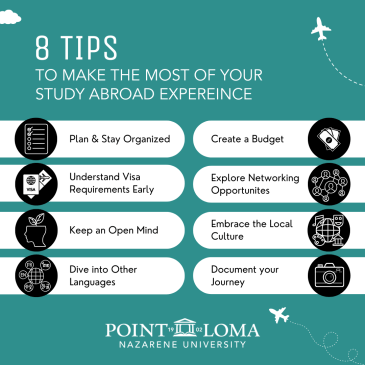
Do you dream of studying marine biology while exploring Australia's coral reefs? Or learning international business in Morocco’s busy markets? PLNU offers students a meaningful international experience combining education, faith, career opportunities, and personal growth. Whether you're ready to register or still deciding, this article covers how to have a successful study abroad experience, giving you the necessary info to maximize your global education and travel experiences.
But first, did you know studying abroad is a great way to invest in your future?
Why Studying Abroad Can Benefit Your Future
Studying abroad is a great way to expand yourself to new experiences while expanding future opportunities. Immersing yourself in another culture can help you learn a new language, which can help you become more competitive in the job market, especially within multilingual or multicultural organizations. This will also improve your communication skills and help you to become more confident in networking.
Additionally, studying abroad improves your independence and personal growth. From navigating an unfamiliar place to time management and problem-solving, you’ll set yourself up to be a more self-sufficient, resilient person.
Here are some tips to take full advantage of your experiences abroad.
8 Tips to Make the Most of Your Study Abroad Experience.
1. Plan and stay organized
Whether your Study Abroad trip is next semester or years away, it’s never too early to start planning for the trip..
Ways you can plan for your study abroad experience today include:
- Schedule a meeting with one of our
- Study-Abroad Advisors
- Thoroughly research your host country
- Learn the language(s) of the countries in which you’ll be studying
- Write down important deadlines
- Talk with PLNU faculty/staff who are involved with the program
Once you’ve decided on a program, attend all pre-departure meetings and orientations. Keep track of important dates and deadlines so you don’t miss out.
2. Understand visa requirements early
Visa processes can be lengthy depending on where you study abroad, so it’s important not to procrastinate on this. Ensure your passport is valid and won’t expire while abroad. Have your passport and visa ready at least six months before you leave. Ask the Study Abroad office if you’re unsure of any requirements.
And for added peace of mind, make copies of all your important documents. When abroad, make sure to keep all important documents (especially your passport) secured and on your person at all times.
3. Keep an open mind
Studying abroad forces you out of your comfort zone, so make the most of the time you’re there! Avoid getting stuck in a mindset that’s resistant to change. Instead, embrace this opportunity to experience new perspectives, try different foods, and join cultural events.
Participate in activities outside the classroom such as joining a local sports team, taking a cooking class, or finding a photography class. Or, see if you can make time to travel to popular cultural sites or travel hotspots that aren’t part of the itinerary.
4. Dive into other languages
Language learning in class builds a strong foundation in vocabulary and grammar. But speaking fluently happens when you’re fully integrated into it. Studying abroad surrounds you with native speakers so you can hear and speak conversational language.
Here’s how to improve your communication skills while studying abroad:
- Study common words and phrases before traveling
- Live with a host family
- Watch TV and movies in the local language
- Use a dictionary or language learning apps like Duolingo, Babbel, or Rosetta Stone.
- Practice your writing skills
Even if English is spoken in the country in which you’re studying, try to challenge yourself to learn local phrases and idioms. It’ll help you to return home with a fresh perspective on yourself or the world around you.
5. Create a budget and get a credit card

Once you’ve chosen a host country, save money and create a budget ASAP. Just as you would in an everyday budget, allot money for necessities like food, lodging, and travel — but don’t forget to set aside a bit for souvenirs too! If you’re unfamiliar with the currency, brush up on the exchange rate to know how much you’re spending.
Here are some tips for using a credit card abroad:
- Notify your bank about your travel plans
- Use a card that doesn’t have foreign transaction fees
- Have multiple payment options in case your credit card isn’t accepted
- Make sure to plan for unexpected expenses.
6. Fill medications beforehand and get insurance
Research the health requirements of your host country. Are there specific vaccinations or health documentation you need before arriving?
Make sure any medication you take is legal in your study-abroad country. Bring enough to last your entire stay. If that’s impossible, see if you can ship your medication or get a local doctor to refill it.
Verify your current health insurance covers you while abroad. Ensure you have comprehensive coverage for things like emergency care.
7. Explore networking opportunities
Studying abroad opens doors for international friendships with students and educators. You can attend events, conferences, or meetups with professionals, professors, and experts. These all expand your global network and strengthen your resumé.
A strong international network can open doors to jobs, internships, and collaborations worldwide. Use your time abroad to show employers you’re adaptable and understand different cultures.
8. Document your journey
Make sure to take photos and videos so you can look back on your time abroad. You can also keep a journal or start a blog to document your journey, which are especially helpful to reflect on your experiences, overcome homesickness, and track your personal growth.
Topics to write about include:
- Accomplishments or achievements
- A gratitude list
- Daily highs and lows
Although you don’t want these things to prevent you from engaging fully “in the moment” during your trip abroad, you’ll be glad to have captured those moments to remember your travels.
Next Step: Preparing for Your Study Abroad Journey
It’s hard to imagine a better place to study than the campus of PLNU, but there’s a whole world waiting for you to explore while continuing your college education.
If you're ready to embark on your study abroad journey, contact the Study Abroad Office.
We’re here to answer your questions, help you choose the right program, and support you throughout your study abroad experience.